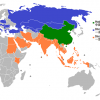This analysis was first published by Chatham House in June 2017 as part of the research paper “The Future of Europe: Comparing Public and Elite Attitudes”.
These are difficult times for the European Union. For the first time, a member state (the UK) has decided to abandon the project. In parallel, notwithstanding recent electoral setbacks, Eurosceptic voices remain prominent across the continent. Despite this, Spain is still a bastion of support for the integration process. Data from a new survey demonstrates this: 44% of Spaniards are convinced that the EU should have more competencies and finally become a United States of Europe, the highest of any country in the survey.
“Even after the huge impact of the economic crisis and austerity measures, anti-European sentiment is still largely unacceptable in the politics of Spain”
Traditionally, there have been no major Eurosceptic parties in the Spanish parliament. Even after the huge impact of the economic crisis and austerity measures, anti-European sentiment is still largely unacceptable in the politics of the country. The advantages associated with the European project are one of the most important reasons driving Spanish support for the EU. Compared to the other western European samples in the survey, a higher percentage of Spaniards believe they have benefited from being part of the EU (45% agree, against 25% who think the opposite). This attachment to the European project prevents political parties developing policies that are hostile towards the EU since there is little public appetite for these, as has been seen in recent elections in both 2015 and 2016.
The benefit of EU integration for Spain is, undoubtedly, material (it has been a net receiver of European funds for so many years). These funds have been instrumental in the modernization of the country and in providing new opportunities across society. But Spaniards also identify as especially successful EU policies some of the immaterial aspects of EU membership, such as the freedom to live and work elsewhere in the EU or the elimination of borders between member states. Decades of international isolation under a dictatorship help explain this: Spaniards know they are better off when they open themselves to the world.
Forty years of Franco’s regime explain many other aspects of the Spanish position towards the EU. For Spaniards, Europe means openness but also democracy, the rule of law and social progress. Despite the severe economic crisis, this is not so quickly forgotten, not least given a comparatively weak national identity and heavy reserves of scepticism towards Spanish politicians and institutions. The existent aversion to authoritarianism helps explain the practical inexistence of extreme right parties in Spain and the strong performance of the country in many social indicators, including tolerance towards homosexuals (71% of the Spanish people agree with same-sex marriage, with only 12% against) or acceptance of immigrants.
Spaniards are used to meeting foreigners in their daily life (Spain is the third most visited country in the world, with around 60 million annual arrivals) and they are aware of the huge economic benefits of tourism. More think that immigration has been good for the country than not (the only nationals in the survey, together with Britons, who think this way). Moreover, Spain is the only country in the sample that feels more positive than negative about accepting refugees (26% in favour, 25% against) and economic migrants (25% in favour, 22% against). There is another important factor that explains Spanish positive views towards migration: Spain itself has traditionally been a country of emigration, both to the rest of Europe and Latin America. This trend has reappeared as many people (especially young people) have left the country since 2008 following the economic crisis.
Some analysts have claimed that the positive attitude towards foreigners in Spain was not genuine but rather a consequence of the comparatively small amount of immigrants living in Spain, and/or the good economic situation of the country. The data prove them wrong. Since the turn of the century, several million people have moved to Spain, growing the number of immigrants by more than 10% in only a few years. The economic argument is also not very solid – there was no significant increase in negative attitudes towards foreigners when the economic crisis hit and unemployment levels reached historic highs.
“Spaniards believe that many existing problems require European solutions”
Still, it is true that integration of foreigners has been facilitated by the fact that many share Spanish as their native tongue (those coming from Latin America) or are very fast at learning it (as is the case of Romanians, the largest foreign community in Spain). The integration of the second (and successive) generation of immigrants in both the public and private spheres will be a key question for the future.
The recent crisis has been a litmus test of Spain’s Europeanism. There has been neither a surge of Euroscepticism nor of anti-immigration sentiment in the country, although it is true that the so-called ‘naïf Europeanism’ which used to exist in the country (with no criticism of any decision taken in Brussels, no matter how good or bad it was for Spain) is no longer there either. The European Union is seen as a project of not only economic benefits, but also of values, which Spaniards are willing to share with other countries aiming to join the EU (only 21% are against enlargement).
This vision stands with the fact that Spaniards believe that many existing problems require European solutions. For migration, 82% support a common policy (according to data from the autumn 2016 Eurobarometer), 83% support a common approach for security and defence, while 70% support the common currency as a solution to some economic issues. Equally importantly, immigration is not considered a problem, openness and tolerance are widespread (the EU and globalization are seen as synonyms of these), and there is an important aversion to authoritarianism. Finally, the electoral system has helped to weed out more illiberal political parties.
Salvador Llaudes
Analyst, Elcano Royal Institute | @sllaudes
Read also: The Spanish Exception: Unemployment, inequality and immigration, but no right-wing populist parties, by Carmen González-Enríquez



